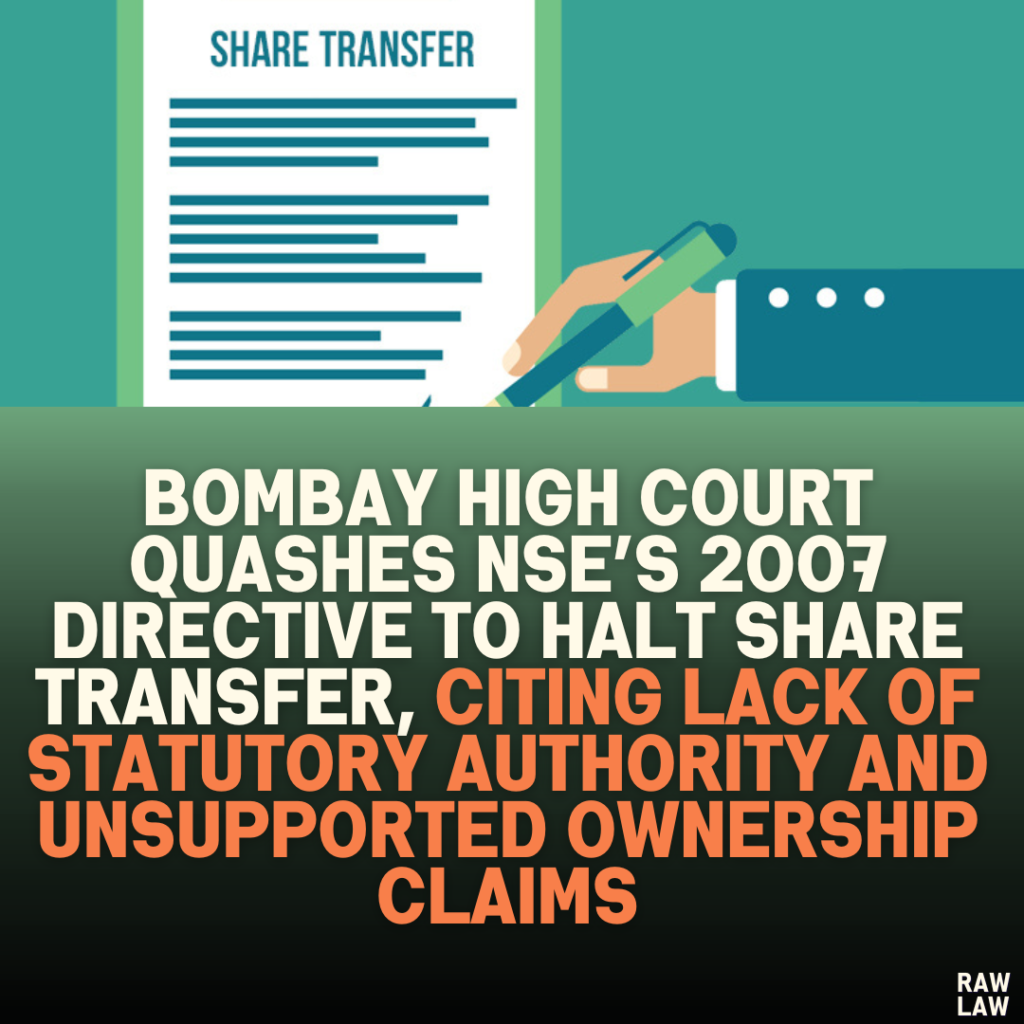Court’s Decision:
The Bombay High Court quashed the National Stock Exchange (NSE)’s 2007 directive to halt the transfer of shares held by the Petitioner in Dr. Reddy’s Laboratories, citing a lack of statutory authority by NSE to issue such a directive. The court directed NSE to comply with procedures for issuing duplicate share certificates and instructed Respondents to transfer accumulated dividends to the Petitioner’s account.
Facts:
The Petitioner acquired shares in Dr. Reddy’s Laboratories between 1986 and 1997. However, a directive issued by NSE in 2007 instructed the Transfer Agent to halt any share transfer. The Petitioner, despite holding 1800 shares, was unable to transfer or receive dividends due to NSE’s directive. NSE alleged that the shares were connected to a defaulted trading member and intended to transfer them under Section 108 of the Companies Act, 1956. Despite numerous efforts by the Petitioner to resolve the issue and obtain duplicate share certificates, the Transfer Agent and NSE continued to deny the request.
Issues:
- Whether NSE’s 2007 directive to halt the transfer of shares held by the Petitioner was legally valid.
- Whether the shares constituted assets of the defaulting member, as claimed by NSE, thereby justifying NSE’s directive.
- Whether NSE could raise defenses of delay and alternative remedies in light of its actions.
Petitioner’s Arguments:
The Petitioner argued that NSE had no legal authority to issue the 2007 directive, as the shares did not belong to the defaulting member. The Petitioner also contested NSE’s alternative remedy argument, asserting that NSE’s communication was neither an “order” nor a “decision,” thus not appealable to the Securities Appellate Tribunal. Additionally, the Petitioner emphasized that the shares remain in his name, as corroborated by Dr. Reddy’s Laboratories.
Respondent’s Arguments (NSE):
NSE contended that the shares in question were connected to a defaulting trading member, justifying their directive. NSE argued that the shares were transferred for consideration, citing endorsements on transfer forms. NSE also raised preliminary objections on delay and alternative remedy, contending that the matter should be referred to the Securities Appellate Tribunal.
Analysis of the Law:
The Court analyzed the writ jurisdiction applicability, citing that stock exchanges, including NSE, are amenable to writ jurisdiction under Article 12 of the Constitution of India, as they perform public duties and regulatory functions. The Court also reviewed the scope of Section 23L of the Securities Contracts (Regulation) Act, finding that NSE’s directive was neither an order nor a decision and thus did not fall within the Tribunal’s jurisdiction.
Precedent Analysis:
The Court referenced decisions such as K.C. Sharma v. Delhi Stock Exchange and Trilochana K. Doshi v. Stock Exchange of India, where stock exchanges were held amenable to writ jurisdiction. These precedents emphasized the public duty aspect of stock exchanges, strengthening the argument that NSE’s actions were reviewable by the High Court.
Court’s Reasoning:
The Court reasoned that NSE’s directive lacked statutory authority, as the shares did not belong to the defaulting member, and NSE’s claim to the shares was unsupported by any transfer forms listing the defaulting member as a transferee. Further, the Court noted that NSE’s reliance on a decade-old recovery claim without any follow-up action undermined their position. NSE’s arguments on delay and alternative remedy were dismissed as irrelevant, given the absence of statutory authority for its directive.
Conclusion:
The Court quashed the NSE’s directive, emphasizing that the 2007 communication lacked legal basis to restrict the Petitioner’s right to shares and dividends. NSE was directed to lift its directive, enabling the Petitioner to receive duplicate share certificates and withheld dividends.
Implications:
This ruling reinforces the view that stock exchanges are bound by their regulatory limits and cannot act arbitrarily in restricting shareholder rights. The Court underscored the public accountability of exchanges like NSE, particularly in matters impacting investors’ property rights, thereby ensuring transparency and adherence to statutory limits in their functioning.
